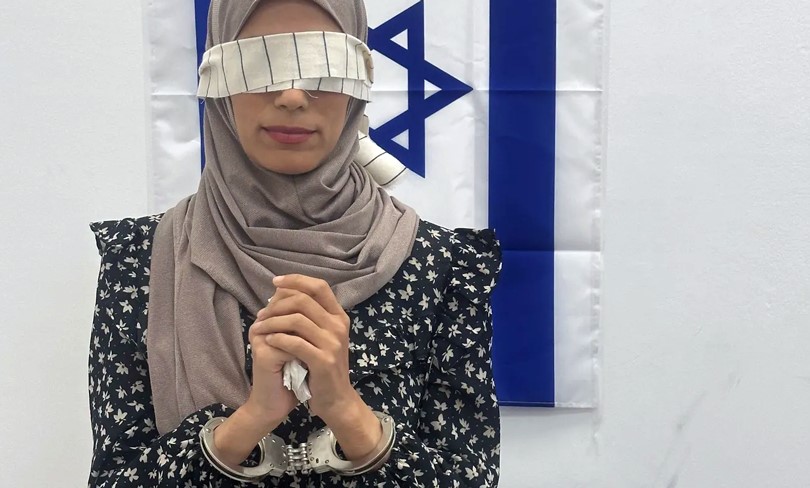
On October 7, 2024, Intisar Hijazi, a Palestinian citizen of Israel and school counselor in Nazareth, was accused of “incitement to terrorism” for reposting a TikTok video of herself dancing from one year ago.
Just hours after posting the video, she was arrested. A photo of her, blindfolded behind the bars of the police car window, appeared almost immediately on Israeli Minister of National Security Itamar Ben-Gvir’s social media, where he claimed credit for her arrest. He claimed she had “incited and supported” terrorism by posting the video.
An investigation by NIFC project partner FakeReporter found that Ben-Gvir’s claims that she ‘incited terrorism’ were not only baseless, but represented a “serious failure on the part of the Israeli police, who acted recklessly and arrogantly.” The video, they explained, was part of an Internet trend from September of 2023, and Intisar’s post — filmed and uploaded on October 7, 2023 — went up before almost anyone fully understood what was happening in Israel’s south. While perhaps poor timing to participate in the dance trend, it was clear that Intisar was not “celebrating October 7” as Ben-Gvir suggested. Indeed, FakeReporter found that few if any of her videos involved political content. Her feed did include posts mourning Israeli victims of Hamas’ attack.
Still, the police followed Ben-Gvir’s instructions. Intisar was detained for 72 hours. NIF grantee Standing Together organized a demonstration outside the Nazareth court where she was held, demanding protections for free speech and opposing politically-motivated persecution of Palestinian citizens of Israel.
Intisar’s arrest and detainment is one example within a larger trend of repression of Arab citizens’ right to free speech. According to NIFC project partner Adalah: The Legal Center for Arab Minority Rights in Israel, during the first seven months since October 7, the number of indictments for the crime of “incitement to terrorism” — which can mean as little as attending a demonstration or posting on social media — is more than double what it was over the four year period prior (2018-2022). Adalah also reports that the targets of charges related to hate speech or incitement are almost exclusively Palestinian citizens of Israel and residents of East Jerusalem.
NIFC project partner The Association for Civil Rights in Israel (ACRI) has called for an investigation against Ben-Gvir charging that he violated a High Court ruling that explicitly forbade him from intervening with the police. The police conduct toward Intisar, say ACRI’s lawyers, is a “serious violation of the detainees’ rights to due process, dignity, and privacy, all in order to humiliate them and deter and silence the Arab society as a whole, in violation of the law.” And details uncovered by FakeReporter have allowed for the Israeli media to more clearly report Intisar’s arrest as a story not of potential incitement, but of how Ben-Gvir’s racist and autocratic inclinations are influencing police decisions.
The crime of “incitement to terrorism” — practically a dog whistle for stifling the speech of Palestinian citizens of Israel – is something that right-wing members of the Knesset want to crack down harder on. They are set to vote on a bill at the end of the month that would require the Shin Bet to vet all teachers for “suspicion of support or sympathy for terrorism” — something the Shin Bet itself, as well as the Israel Teachers Union expressly opposed. NIFC project partner Sikkuy-Aufoq called this bill a clear attempt to “intimidate and silence […] every female Arab educator in the country,” and create a culture of censorship and fear for any teacher who might dare to “express a political opinion or hold a challenging dialogue.”
A few days after Intisar’s arrest, another government minister attempted to shut down free expression of Palestinian citizens elsewhere in Israel. “Lyd” is a documentary film that tells the Palestinian narrative of 1948 of the city Israeli Jews call Lod. The film was set to be screened in a Jaffa theater. But following orders from Israel’s Minister of Culture, Miki Zohar, the police cancelled the screening, arguing that a film highlighting the Palestinian narrative around 1948 would escalate tensions and spark violence in the mixed city of Jaffa.
Half of “Lyd”’s story is told through documentary footage from 1948; the other half is an animated vision of a future that might have existed without the 1948 Nakba. As a line from the film states, “political imagination is an act of resistance and our best, maybe our only hope for a better future,” and we must “challenge what we know through imagining things that don’t yet exist.” It is precisely this vision – of a future Israel without war, a more democratic and equal Israel – that motivates NIF and its grantees to take action. Whether through acts of protests, the courts, or through investigations, NIF and its grantees are fighting back against repression and censorship and working to protect the fundamental rights of all.
To listen to Tamer Nafar, a Palestinian citizen of Israel and rapper from Lod, talk about his personal experience living in that city every day, you can listen to him talk to NIF’s Libby Lenkinski on the Forward’s podcast, Make Art Not War.
